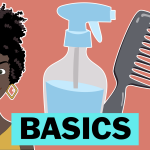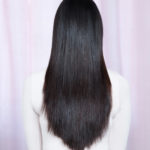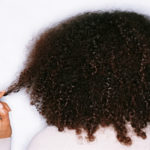When I had my first child a few years ago, I wasn’t too bothered by the possibility of losing my hair; in fact, I wasn’t even on a hair journey. On occasion I had heard people complain that they had lost chunks of hair but I just thought it was the off chance. Man was I wrong!
Fast forward a few years down the road and I am a healthy hair convert with precious cargo and someone says “I hope it’s going swimmingly.” Yeah sure it’s swimming in my head that I might have bald patches in a few months.

So I delved into being proactive by researching ways to dodge that bullet. The last time I shed a little light on the fact that while it’s not the norm, there are some women who lose hair during pregnancy. What most persons may be familiar with is postpartum shedding or losing hair after your pint sized tenant exits the ‘mother ship’.
It’s bad enough that your body goes through nine months of the extraordinary feat of nurturing life and surviving as a portal to this world, but then to find out three to six months after the grand entrance, you have to deal with rapid hair loss to boot! Well that’s enough to frustrate anyone, especially when you’ve been good about doing all you need to do to retain length on this healthy hair journey.
No doubt, there are some of you going through it now, we’ll focus on how you might be able to go about fighting postpartum shedding.
Causes of Postpartum Shedding
I probably should have said that not everyone experiences postpartum shedding. For those who have and will go through this, it’s important that you understand that it’s not uncommon so don’t think you are becoming a freak of nature if all the lush growth you developed during pregnancy starts coming out by the handfuls.

The process is scientific. what happens is that the anagen stage – which is the growth stage of hair- often accelerates during pregnancy. More hair follicles actually become active during this time and the normal daily shedding that would take place is drastically slowed, so that’s why during pregnancy the hair often gets thicker and longer. Also, around this time the hormones are high and this accelerates growth as well.
Postpartum shedding often sets in anywhere from three months to six months after you have your baby and its effects can last over a year. Remember that usually during that nine month stretch, little to no shedding takes place. What happens is that as your body returns to normal hormone levels, the hair growth cycle kicks in and says “Hey! It’s been a while since I did some cleaning”; hence, most of those extra follicles that came into operation during pregnancy, start to let go off the hair that should have shed.
The thing is that with regular shedding hair is often released a little at a time. With postpartum shedding however, the problem is that it all happens at once; there seems to be a drastic release of hair instead of a slow and measured periodic effect that you get with normal everyday shedding. What makes matters worse, is that you can go for days and it will seem like every time you breathe you have handfuls of hair falling out everywhere, then you notice the thinning.
What Should You Do?
Prior To Delivery
- Stay calm– this is easier said than done if you’ve never heard of postpartum shedding, but one way to calm yourself is to be informed. Once you are informed, remind yourself that stress will only make the situation worse. It also helps a tad if you remind yourself that it will grow back and unless your hair and scalp are severely damaged, you will not go completely bald.
- Know what to expect – while persons have documented loss on Youtube showing huge bald patches all over the head, postpartum shedding usually occurs at the edges; the widow’s peak, temples and nape area. Knowing this can assist you in that you can alter your styling choices to limit the excessive loss in some cases. In cases where loss is still a bit much, you can style your hair in such a way that it covers the affected areas. Some women use this opportunity to get a tapered cut.

During And Post Pregnancy
1. Use low manipulation styles during pregnancy
anything that is going to put stress on your roots or your hairline should be avoided to be on the safe side. While it may not prevent postpartum shedding, it can certainly limit the number of follicles that yield when its time to shed. Hair that is pulled and strained will definitely go so try loose twists, bantu knot outs, wash and gos and buns that are not tightly pull. Remember to follow up with these low manipulation styles until your hair gets back to full strength.
2. Do tea rinses
Tea rinses are great for cutting down and preventing excessive shedding. If you don’t already know, educate yourself on what the different types of tea are good for when it comes to hair care and use one in your regimen.
3. Ramp up your diet with 70-80 grams of protein per day
Remember that the structure of hair is made up of 91% protein. Your body will be working overtime trying to stay healthy while you nurture your newborn. You really don’t want to have a protein deficiency because if you do, your body might just draw it from your hair and you know that spells trouble.
4. Boost your vegetable and fruit intake
What you put inside your body will be even more beneficial at this time so don’t try to focus on what hair product to use, remember that the follicles are fed from the food you put in. You will need to ensure your blood is pumping with those extra vitamins* needed to nourish yourself and the baby and still have enough left to nourish your hair from the inside.
Those who follow Jenell on Youtube will recognize that she does quite a bit of juicing especially during and post pregnancy with her daughter, do not underestimate the power of juicing; whip up a green smoothie or whatever works for you. Just make sure you get those vitamins* in.
5. Work on balancing your hormones
Since it is the drop in the hormone levels that is fingered as the culprit in excessive shedding post pregnancy, see about finding ways to gradually step down from that hormone rush. You might find answers in vegan diets or supplementing with vitamins*.

Several YouTubers credit a tweak in their diets contributed significantly to fighting postpartum shedding. One in particular found that drinking nettle tea three times weekly and taking macca root as well as continuing prenatal vitamins*, helped in that regard.
The nettle helped in milk production as well as with hair growth and skin rejuvenation. Remember though, that herbs can have varying effects on different people so it would be best to research how these work and consult a professional before jumping in headfirst.
6. Do not abandon growth stimulating oils
Castor oil* and sunflower seed oil are oils that people swear by when it comes to maintaining or growing in thick healthy hair. During the pregnancy an oil rinse each week or at least once a month could be beneficial. Applying your castor oil* or sunflower seed oil after pregnancy is also encouraged.
7. Use garlic to limit shedding
This can be some garlic paste or juice you make or a commercial garlic shampoo*.
And finally limit your use of heat and Stretch your relaxer for a while post pregnancy to ensure it regains some strength.
Here’s to hoping you do not have to go through postpartum shedding, but if you should or you are presently going through this, check out the tips hair and in the videos here to see how you might make a quick recovery. Until next time, happy hair growing.
Here Virginia21107 talks about her experience with postpartum hair loss on relaxed hair
Here, Dr. Amy Grace Harper explains how a diet rich in herbs and vegetables can assist with fighting or recovering from postpartum shedding
Well thats it, what has your experience been with post partum shedding?














Is there a certain amount of time you should wait after having a baby when getting a relaxer? I’ve had 3 kids last one being December 2014 and I haven’t experienced post partum shedding with the other 2 but I know every pregnancy is different. I was also informed that medications given during labor can stay in your system for up to 6 months after baby. Is that true?? Any advice is helpful! Thank you!
Needed this!!!